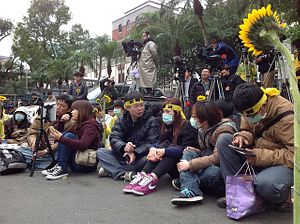In an interview with the Chinese-language magazine Business Weekly on June 19, Hilary Clinton, former U.S. secretary of state and potential candidate in the 2016 U.S. presidential election, declared her stance on the Taiwan-PRC relationship. While supporting cross-Strait exchanges, Clinton predicted that down the road, Taiwan’s push for closer cross-Strait ties could lead to an over-reliance on the People’s Republic of China (PRC), and urged Taiwan to reevaluate the pace of its engagement with the PRC.
Clinton’s concern implies that economic dependence could bring about political dependence. But do Clinton’s assumptions fully apply to Taiwan-PRC relations? Some unique conditions in Taiwan may work against economic dependency.
Nothing But Politics
Some might argue that the increasing exchange across the Taiwan Strait is a two-way street. In most cases of exchanges between two countries, “interdependence” occurs instead of a lopsided impact to one side. That is, while Taiwan’s economy would become increasingly reliant on the PRC, the PRC’s economy would also be economically vulnerable vis-à-vis Taiwan. However, when it comes to cross-Strait relations, the situation is tricky.
Obviously, Taiwan’s freedom of action has been constrained by the PRC, both because Beijing can influence other parties in their relations with Taiwan, and because ultimately, Beijing can squeeze Taiwan both economically (Beijing accounts for nearly 40 percent of Taiwan’s exports) and militarily, if the PRC is willing to pay the price. As an example, consider Taiwan’s current situation negotiating free trade agreements (FTAs). It seems that finishing the cross-Strait Economic Cooperation Framework Agreement (ECFA) is inevitably a first step for Taiwan if it wishes to pursue membership in either the PRC-led Regional Comprehensive Economic Partnership (RCEP) or the U.S.-led Trans-Pacific Partnership (TPP). The connection between the PRC and the RCEP makes concluding the ECFA a threshold for Taiwan’s acceptance into the RCEP, but Taiwan still cannot get away from the PRC’s influence in the TPP negotiations. There are several countries with overlapping memberships in the two FTAs, and the PRC could tactically exert its economic power to control Taiwan’s international economic space. The PRC would be more willing to “allow” Taiwan to join the TPP if Taiwan signs the RCEP first.
Realistically Taiwan truly has no discretion in deciding on the sequence of signing FTAs. While it is theoretically possible for Taiwan to reach out to other countries for bilateral economic cooperation, those countries are only likely to enter into such relations when the PRC promises not to interfere. Most countries would avoid endangering their own economic relations with the PRC.
Growing Taiwanese Identity
This is not to say that Taiwan is ready to acquiesce to this reality. To the PRC’s surprise, enhancing economic and people-to-people exchanges have amplified the voices of those who support Taiwan independence. On the economic front, a public opinion poll conducted by Taiwan Indicators Survey Research (TISR) in June 2013 indicated that up to 48.9 percent of Taiwanese people think that the ECFA has not helped improve Taiwan’s economy, while only 28.3 per cent hold the opposite opinion. Following the Sunflower Student Movement of March 2014, which protested against the passing of the Cross-Strait Service Trade Agreement (CSSTA) by the ruling Kuomintang party without a clause-by-clause review, negative attitudes toward the ECFA have grown steadily. A poll conducted by the Grassroots Influence Foundation in early May showed that while the majority of Taiwanese support economic liberalization in general, most are doubtful about deepening economic interaction with China. When asked about their attitudes on the CSSTA, as many as 51.3 percent of those who support economic liberalization reported objection to the pact, whereas 87.5 percent of those opposing economic liberalization were against it.
Further, surging people-to-people exchanges have appeared to make Taiwanese people more aware of their “identity,” offering them a chance to clearly examine the fundamental difference between the two sides. In a public opinion survey report published in July 2014 by the National Cheng-chi University Election Study Center, when people in Taiwan were asked about their identity, 60.4 percent reported seeing themselves as Taiwanese, with only 3.5 percent regarding themselves as Chinese and 32.7 percent thinking of themselves as both, the lowest percentages on record.
Domestic Consensus Required
Faced internationally with the constraints imposed by China’s political calculation and domestically with a growing sense of Taiwanese identity, Taiwan’s government is in a difficult position. Recent tensions in Sino-Japanese relations could further aggravate Taiwan’s international status, for China and Japan would be likely to focus on competing for better relations with South Korea rather than Taiwan. (In fact, even a warming Sino-Japan relationship – if that were to happen in the near future – would not serve Taiwan well.) In any event, for Taiwan, there is no room to play such strategic games to improve its situation (by choosing to align with certain neighboring countries), because Taiwan is not as strategically valuable as, say, South Korea. For future development, Taiwan seemingly cannot rely on establishing strategic foreign relations to survive – neither by balancing nor bandwagoning. The only thing Taiwan can and should do to avoid being marginalized is to build its own value, to form a more sustainable and substantial strategy; a survival strategy built from within, not from the outside. However, this strategy would require a domestic consensus on political and economic goals, which Taiwan has lacked for a long time.
Emily S Chen is a graduate student in the Center for East Asian Studies at Stanford University with a focus on international relations.

































